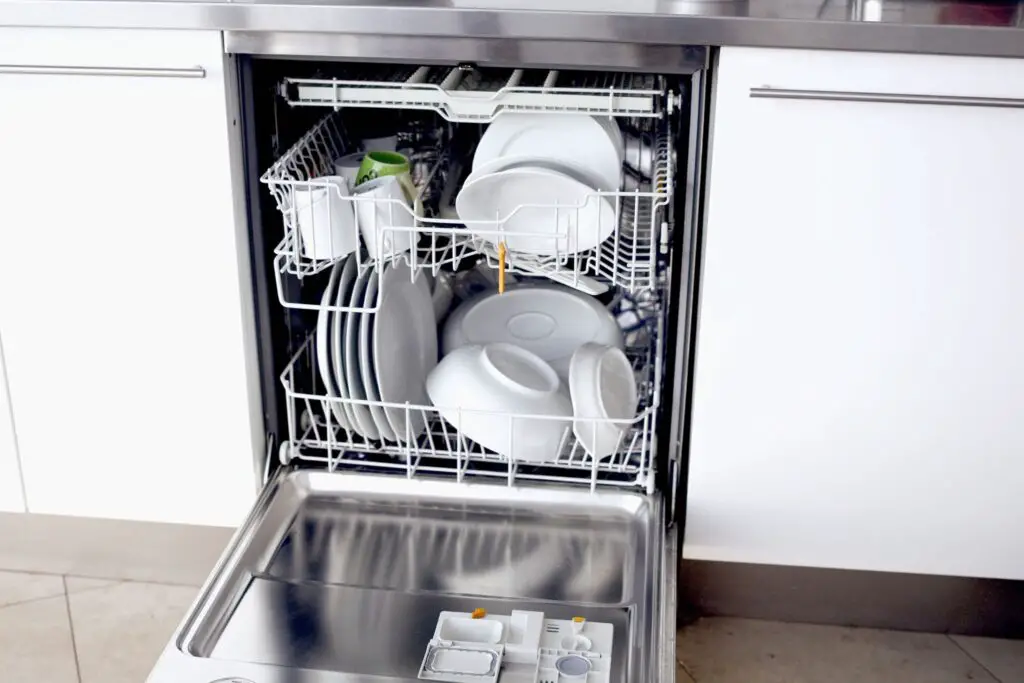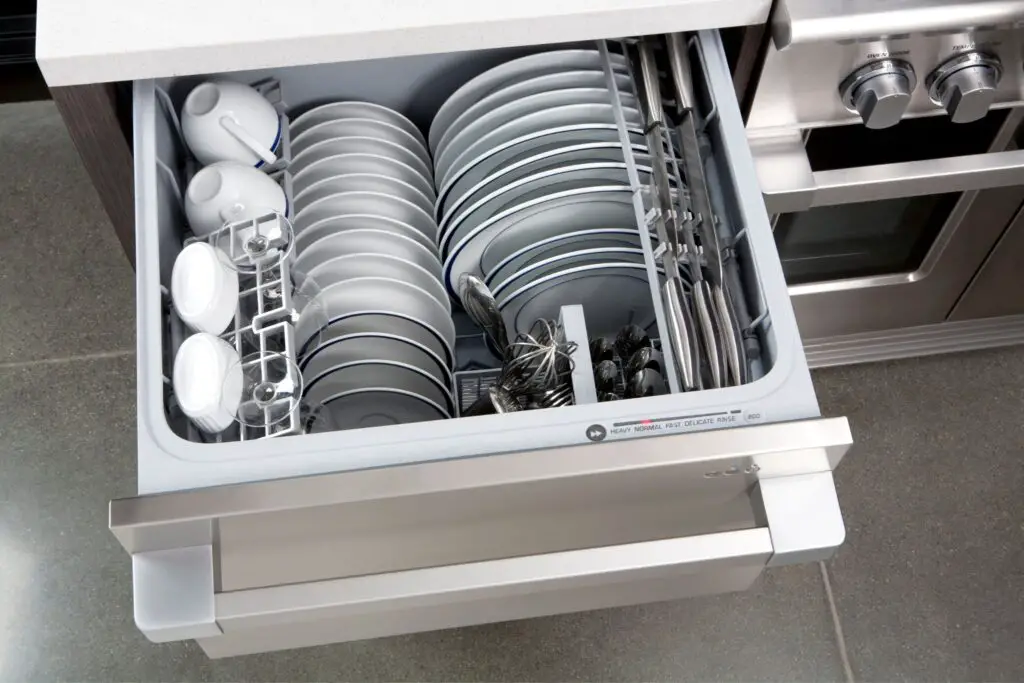Originally Created on: March 16, 2023 @ 2:58 pm
Why is my dishwasher melting plastic? A dishwasher may tend to melt plastic utensils giving them an odor and causing discomfort and frustration; there may be many possible solutions depending on the cause.
Many people with a dishwasher have encountered this problem and, if not, are still in danger of experiencing this problem; the heat may sometime surpass the typical melting point of the utensils, mainly the plastic ones.
It is common logic that when exposed to heat, plastics tend to melt at 100 degrees Celsius(212F).
Still, dishwashers have a regulatory system in their working mechanism to ensure that the sprayed jets of water washing and rinsing the utensils are of the correct temperature.
You may experience a hard time cleaning it, and without the proper guide, you are bound to damage the dishwasher’s heating element.
Also Read: How To Ship A Dishwasher? [4 Steps + COMPLETE Guide]
Table of Content
Why Is My Dishwasher Melting Plastic?
A common mistake most dishwasher owners make is failing to check their dishwasher’s temperature. If you do not check the temperature of your dishwasher and leave it at a very high temperature, the dishwasher may become too hot and melt the plastic.
The modest temperature to set your dishwasher is 120 degrees Fahrenheit (49 degrees Celsius). This also helps in the maintenance of the dishwasher.
Placing the dishes close to the dishwasher’s heating element also puts the utensils at risk of melting. The rack should be positioned to ensure plastic utensils stay at the dishwasher’s top to prevent them from melting.
When plastic utensils are in close contact with the heating element, they are exposed to extreme temperatures, which is the cause of the melting of plastics, which applies to plastic utensils.
Sometimes the drying cycle produces a lot of melting plastic utensils. You can lose the drying cycle if your dishwasher has one; altehttps://mykitchenapex.com/why-are-my-dishes-sticky-after-dishwasher/rnatively, remove all plastic utensils before the process commences.
You can also avoid using some plastics because their materials are not dishwasher conducive due to their tendency to melt at temperatures as low as 110 degrees Fahrenheit.
Sometimes the age of the dishwasher also triggers its malfunctioning. After serving a long time, the dishwasher may malfunction in its thermostat, which in turn malfunctions heat regulation.
The dishwasher, at this point, produces much heat or even less heat than needed, which means that either the utensils will not attain proper sanitization or they will be burned due to the high heat level.
What To Do If Plastic Melts In The Dishwasher

After the causes of plastic melting have been discussed, you should have had the constraint of wondering what to do to the molten plastic on the dishwasher coil.
Often people seek to replace the ring, which is a controversial necessity; you can clean off the plastic and have your heating coil running without the odor. This is a cost-effective remedy if you’re to experience this problem repeatedly.
To institute the cleaning process, you must ensure that the dishwasher is unplugged and adequately aerated to ensure that the dishwasher’s heating coil is excellent and to avoid electrocution.
Then ensure you’ve correctly emptied the dishwasher, and when the heating coil is perfect, place an ice bag on the molten plastic to ensure the removal process is more straightforward.
Proceed to remove the ice from the heating coil while extracting the removed plastic pieces from the dishwasher by rubbing a non-metallic object over the heating element, trying to avoid damaging it and removing as much plastic as possible.
Place a clean towel over the heating coils of the dishwasher after soaking it in acetone-based nail paint remover.
Let the acetone dissolve the residual plastic on the coils for about five minutes, don’t pour it directly. Use the same cloth to scrub the coils until all plastic has been eliminated.
Ensure you scrape more significant pieces of plastic. Mix a few drops of dish soap with a gallon of warm water. Soak the cloth in this water and clean the heating coils to remove the nail polish remover.
Finish by rinsing the locks with clean water.
Do Dishwashers Get Hot Enough To Melt Plastic?

Can dishwashers melt plastics? Although dishwashers are typically designed to regulate the amount of heat they produce to avoid burning plastic utensils, some factors may lead to a malfunction, or misconduct in the mode of usage may lead to the burning of plastic utensils in the dishwasher.
If this problem has never happened to you, you may question its existence, yet it happens to a variety of people even daily.
A dishwasher’s working temperature is between 120 and 160 degrees Fahrenheit (49 and 71 degrees Celsius), which is hot enough to sterilize dishes and get rid of stubborn stains but not hot enough to melt most plastic products.
Although the dishwasher may melt plastic utensils under extreme conditions and sometimes user mistakes, many people question if dishwashers can melt plastics.
One of these factors may be that even though the water temperature is within the acceptable limit, some plastic objects may not tolerate high temperatures and might still melt or distort in the dishwasher.
Before placing any plastic goods in the dishwasher, it’s usually a good idea to verify the manufacturer’s instructions. If in doubt, you should err on caution and hand-wash any objects.
What Causes Plastic To Melt In Dishwasher?
A diverse set of factors can influence the melting of plastic utensils in a dishwasher. Still, dishwashers are typically made to wash dishes without burning materials.
Sometimes the cause can be merely associated with common factors.
Examples of these factors are that certain dishwashing detergents and chemicals, especially those that contain chlorine bleach or enzymes, can be harsh and abrasive.
These substances may harm the plastic’s surface, making it more prone to melting after prolonged usage, and as we all know, most utensils washed in the dishwasher are not for short-term use.
Hand-washing plastic objects or using the dishwasher at a lower temperature is often advised to avoid plastic items melting if a lower temperature option is available.
Also, it’s crucial to adhere to the manufacturer’s care recommendations for each plastic item and to keep plastic objects away from the hot element of the dishwasher.
You May Also Like: How To Keep Dishwasher From Smelling Between Washes [+3 REASONS Why]
Can Melted Plastic in Dishwasher Cause Fire?

Is plastic flammable in dishwashers? Unfortunately, melted plastics in a dishwasher can cause a fire. It is equally significant to know that research has shown that dishwashers are the second highest cause of home fires.
As a result, it does not come as a surprise that melted plastic produces an awful odor and may start a fire.
As we know, the dishwasher contains a heating element at the bottom to raise the water’s temperature and make the dishes even cleaner. Yet, such a vital heat source can equally melt and burn plastics.
Given that it has electrical components, a manufacturing flaw or damage could result in an electrical short, setting off a fire.
To avoid such kinds of accidents, most manufacturers have begun indicating if their products are dishwasher-safe to reduce the rate at which their products melt.
In addition, some manufacturers have tried to simplify things by showing that their products cannot withstand temperatures past a specific limit, helping to regulate their melting.
Conclusion
It is clear that despite the dishwasher being created to reduce the workload that most people despise, it has its faults.
These damages can be avoided and controlled by ensuring that one sticks around when the dishwasher is running.
Secondly, do not place plastics at the bottom rack, and always ensure every utensil set in the dishwasher is safe.

![Why Is My Dishwasher Melting Plastic? [The SHOCKING Truth]](https://mykitchenapex.com/wp-content/uploads/2023/03/Why-Is-My-Dishwasher-Melting-Plastic-The-SHOCKING-Truth.jpg)